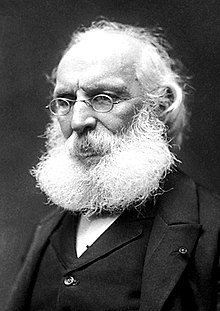Frédéric Passy
| Frédéric Passy | |
|---|---|
 |
|
| Born |
Frédéric Passy May 20, 1822 Paris, France |
| Died | June 12, 1912 (aged 90) Neuilly-sur-Seine, France |
| Nationality | French |
| Education | University of Paris |
| Occupation | Economist |
| Awards | Nobel Peace Prize (1901) |
Frédéric Passy (May 20, 1822 – June 12, 1912) was a French economist and a joint winner (together with Henry Dunant) of the first Nobel Peace Prize awarded in 1901.
Born in Paris to Felix Passy, a veteran of Waterloo, and Marie-Louis-Pauline Salleron, Passy's uncle was Hippolyte Passy, a cabinet minister for both Louis Philippe and Louis Napoleon. Passy studied law and practised for a short time before accepting a position as an accountant in the State Council (Conseil de Droit) from 1846 to 1849. However, under his uncle's influence he gave up this post and returned to the university to study economics. True to his republican principles, he withdrew from politics after the coup d'état of Louis Napoleon and refused to be reconciled to the Second Empire; he was therefore ineligible for any government post. He became a professional economist in 1857, and in 1860 he began to teach political economy both in Paris and in the provinces.
His reputation was established through his Mélanges économiques (1857) essays and a lecture series given at the University of Montpellier and published as the Leçons d'économie politique. He was an advocate of free trade and adherent to the ideas of Richard Cobden. In 1877 he became a member of the French Académie des sciences morales et politiques, a component of the Institut de France; and he was a commander of the Legion of Honor. He was president of the Society of Political Economy for 70 years.
...
Wikipedia
